The Pros and Cons of Flying on Budget Airlines

We’ve come a long way since the height of the COVID pandemic when airfare was hitting all-time lows. In 2024, airline tickets are skyrocketing, with the consumer price index for tickets up by 25 percent, CNBC reported. In light of this, many of us are looking for ways to cut costs with travel, including seeking out low-cost airlines. These carriers offer cheaper fares, but there are a few trade-offs. Read on to learn more about the pros and cons of flying on budget airlines.
RELATED: 7 Surprising Items TSA May Flag You for at Airport Security.
What are the major U.S. budget airlines?
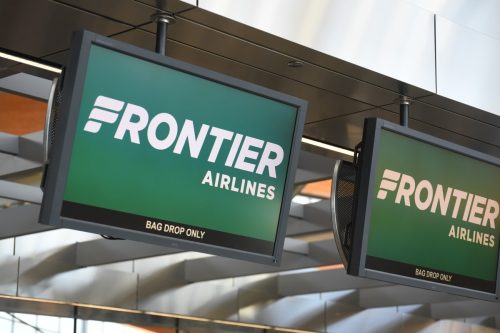
If you use an app or Google Flights to check for the best fares, odds are some of the bigger U.S. budget airlines have popped up for you. Familiar low-cost carriers include Frontier Airlines, Spirit Airlines, Allegiant Air, Breeze Airways, and Avelo Airlines.
Southwest Airlines and JetBlue are also low-cost carriers, although they are considered to be on the “higher-end” of the bunch. Unlike ultra-low-cost carriers, Southwest offers free checked baggage and first-come, first-served seating. JetBlue is now more of a “hybrid” carrier, offering low fares with different amenities, like in-flight entertainment and WiFi.
RELATED: 10 Secrets Flight Attendants Will Never Tell You.
What are the pros of flying with these airlines?
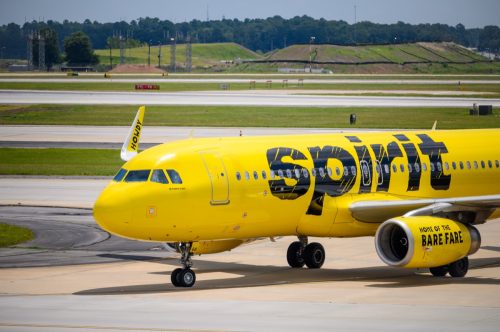
They are more affordable.
Of course, a major benefit of flying with budget airlines is the cheaper fares. If you’re able to travel light and aren’t picky about where you sit or in-flight offerings, you’re the perfect candidate for one of these flights.
Budget airlines have several tactics they use to cut costs, including the “single-class” seating approach (eliminating things like first class and business class) and focusing on short-haul, direct flights. By avoiding longer trips and connecting flights at busier hubs, budget airlines are able to increase the number of flights they schedule.
You only pay for what you need.
In addition to cutting costs on base fares, the a la carte approach that budget airlines use means you can pick and choose what you need when you’re flying.
“Budget airlines’ no-frills approach focuses on a la carte add-ons, allowing passengers to add their preferred services (checked bags, seat selection) and giving them more control over cost,” Robert Antolin, chief operating officer at App in the Air, tells Best Life. “Flexible pricing means passengers pay only for the services they need, allowing them to minimize airfare costs based on their personal preferences.”
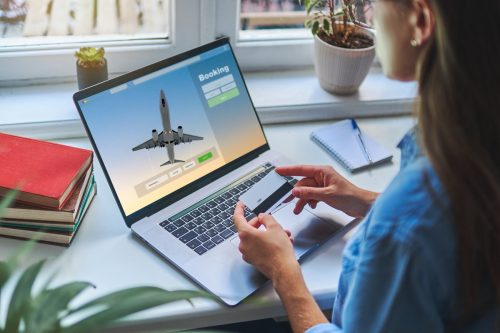
They typically fly out of smaller airports.
In addition to offering lower fares, budget airlines operate out of smaller airports, which can have cost-saving and convenience benefits. Budget airlines have their reasons for this—largely to cut costs and avoid competing with legacy airlines for landing spots—but it can also benefit you.
While you may believe that flying out of larger hubs is quicker and easier, that’s not always the case. The Points Guy notes that smaller airports tend to have shorter lines at security and fewer crowds, as well as more affordable snacks. As a bonus, you also avoid the “hassle of navigating larger airports,” Danielle Desir Corbett, affordable luxury travel and personal finance expert and creator of The Thought Card, tells Best Life.
She notes, “Flying out of small airports like Tweed New Haven Airport (HVN), you can get through security within 15 minutes without TSA Pre-Check.”
Parking is another perk at smaller airports, which generally offer more affordable rates or even allow you to park for free. (Who hasn’t pulled out of the airport after a pricey vacation and discovered you still have to pay an exorbitant fee for several days of parking?)
They often offer deals and promotions.
On top of offering the most competitive rates in general, experts point out that budget airlines also consistently run promotions—helping you save even more.
“Budget airlines also offer promotions and last-minute discounts to attract cost-conscious travelers with flexible travel dates,” Antolin says.
Corbett highlights Avelo Airlines, a budget carrier headquartered in Houston.
“They frequently offer promo codes and seasonal sales, helping you save anywhere from $20 to $30 per booking,” she shares. “By signing up for their free newsletter, stay updated with sales and new route announcements. Just be aware that Avelo emails are frequent, almost daily.”
RELATED: 10 Clothing Items You Shouldn’t Wear on a Plane.
What are the cons of flying with budget airlines?
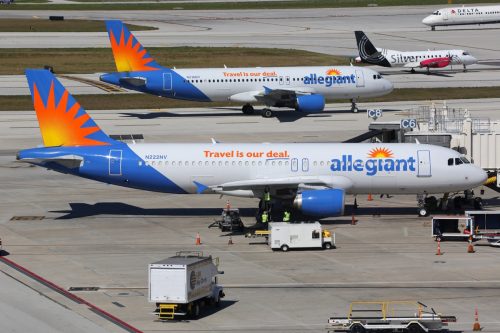
You could end up spending more than you would with a full-service carrier.
Budget airlines draw you in with their super-low prices. But in many cases, once you get to the checkout page when buying tickets, the fare ends up significantly higher than what you were counting on. This is because every amenity—even small stuff like bags and seat selection—comes with a price tag, forcing you to shell out far more than you intended.
“Additional fees for anything beyond basic services can quickly eat into any cost savings and reduce the price difference vs. a full-service airline, while providing a less comfortable experience,” Antolin cautions.
Illustrating this, a 2023 study performed by NetVoucherCodes found that Spirit has the most hidden costs of any U.S. airline—and customers end up paying more than they would with other airlines.
“Our study shows that while Spirit Airlines’ flights seem cheap, passengers are paying up to 736 percent more in hidden charges, a bigger increase than any other airline in the world,” a press release provided to Best Life reads.
They have limited amenities.
While you’ll be on the hook for any extras, like seat selection or bags, there are some things that money can’t buy on budget flights.
“Budget flying, in general, means that you have to sacrifice many significant amenities offered by other airlines in order to save on the flight price. [There is often] also no option for upgraded cabin class, which makes the flight time a lot less comfortable,” Mercedes Zach, travel expert at Asaptickets, tells Best Life.
Because they are mostly short-haul operations, it’s not surprising that budget airlines put less emphasis on comfort and perks. You may be OK with it while booking, but you should consider how you’ll feel about that when you’re in the air.
“Budget airlines tend to be less passenger-friendly. Comfort levels may be lower due to tighter seat configurations resulting in less legroom, lacking in-flight entertainment and meal services, or other extras that are standard on nonbudget airlines,” she says.
Corbett also points out that Avelo, specifically, doesn’t offer power outlets, wifi, or in-flight entertainment.
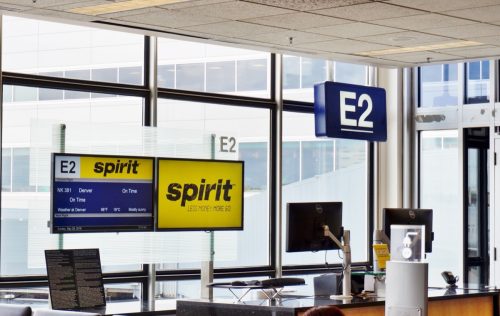
Their customer service can be tricky.
Travel is often a hassle—no matter how much you’re spending on a ticket—so if you run into issues, you want to be able to contact a company representative. Bu Antolin says this is often a problem with budget airlines.
“Customer service tends to be less robust than full-service carriers, [and] while this may not be an issue most of the time, it can be especially painful when dealing with a flight delay or cancellation,” he shares.
Frontier, for its part, caused a stir in 2022 when it nixed its phone support line for customers, now only offering help through chat or text. Breeze Airways did away with its customer service line in 2018 as well.
They have less flexibility if your plans change—or if the airline runs into an issue.
One of the more stressful aspects of booking travel is ensuring your plans are set in stone before clicking “purchase.” But while larger airlines give you some flexibility, allowing free cancellations within 24 hours and options to switch up your flights if need be, budget airlines aren’t as quick to help you out.
“Budget airlines tend to offer less flexibility when it comes to itinerary changes,” Antolin says, also pointing out that if you do make a change, you can expect much higher fees.
Even worse, if your flight is delayed or canceled for some reason, budget airlines aren’t likely to pony up in those instances. According to NerdWallet, it’s “uncommon” for these carriers to provide vouchers for things like hotels or meals. This is compounded by the fact that budget carriers do run into these issues relatively often.
“Delays and cancellations can be more common for budget carriers due to tighter schedules and their use of smaller airports,” Antolin warns. “Their smaller fleet size may also make it more difficult for you to reach your destination in a timely manner if re-booking is required.”
RELATED: 10 Essential Tips for Packing Light.
Are there other affordable travel options?
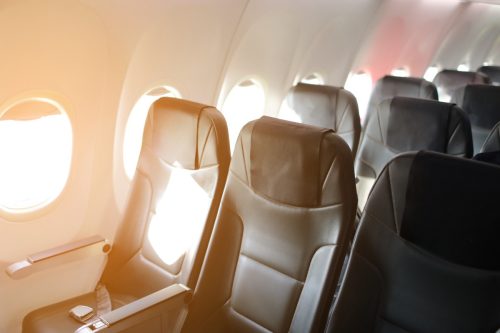
If you’re stuck between wanting to save money and preferring larger airlines, you might want to book a basic economy seat on one of the biggest carriers.
According to NerdWallet, full-service airlines have added this option as a way to compete with budget airlines, offering lower prices with a few caveats. Similar to budget airlines, this ticket is bare bones and best suited for people traveling solo with set dates.
With basic economy, you’ll typically be giving up seat selection, points and miles, and bags, as carry-ons and checked luggage isn’t usually included. Also, in the event you need to make changes, you may be out of luck, NerdWallet points out.